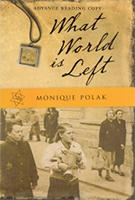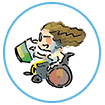 Summary: Anneke and her family are forced to live in Theresienstadt concentration camp during World War II because they are Jewish. Only 14 when she enters the camp, Anneke quickly loses her innocent and childlike nature in favour of survival at any cost. But although death touches those around them, causing Anneke to lose friends and a romantic interest, Anneke’s family makes out of Theresienstadt alive. Now 16, Anneke is forever changed, and must find a way to come to terms with everything her family had to do to survive.
Summary: Anneke and her family are forced to live in Theresienstadt concentration camp during World War II because they are Jewish. Only 14 when she enters the camp, Anneke quickly loses her innocent and childlike nature in favour of survival at any cost. But although death touches those around them, causing Anneke to lose friends and a romantic interest, Anneke’s family makes out of Theresienstadt alive. Now 16, Anneke is forever changed, and must find a way to come to terms with everything her family had to do to survive.
Number of Pages: 215
Age Range: 14-16
Review: Survival, for those who’ve been faced with it, often comes with a price tag. What World is Left by Monique Polak is an incisive, well-written look at the emotional cost of physical survival, based on Polak’s mother’s experiences living in Theresienstadt concentration camp during World War II.
Anneke is a strong, thoughtful character just trying to deal with her new life. Scrubbing cauldrons used to cook soup for the camp, keeping a low profile to avoid attracting Nazi soldiers attention, and being selective in who she befriends because the chance of losing them is so great, Anneke grows up quickly under harsh conditions.
She has trouble understanding when her artistic father participates in something called the Embellishment, a dressing up of the camp to convince Danish investigators the camp has no lethal intentions towards its inhabitants. When the Embellishment is successful the Germans decide to make a propaganda video called “The Fuhrer Gives a City to the Jews,” enlisting Anneke’s father’s help once again.
Anneke is caught between knowing the truth of life in the camp and hating her father for the farce he is helping to perpetrate, until she finds out he is secretly using his talents as an artist to make a visual record of the camp’s reality at great risk to himself and their family.
Polak captures Anneke’s inner turmoil vividly, and I love how she brings Anneke around to realise how much her father did to keep them all alive. At the end of the novel, Anneke is severely beaten down in spirit, but not destroyed. She knows she will be able to find a way to live her life, even though she will be forever marked by what has happened. Anneke’s existential exploration of the great questions of life is continually thought-provoking and memorable.
I would recommend What World is Left to teens studying the Holocaust, because even with all the reading I’ve done about it, I had still never heard about the Embellishment at Theresienstadt. But it is also for those looking for a well-written, deep read about what it means to go through something unspeakably horrific and survive.
Memorable Quotes:
“The way my mind works almost makes me laugh. ‘That Anneke is always inventing stories in her head,’ Opa, who is my father’s father, used to say about me when he knew I was listening. He was teasing, but I know that in some way, he had paid me a compliment. I cannot paint like Father, but I can invent stories. And certainly that is something.” – Anneke from What World is Left by Monique Polak, page 10
“If only I could cry. I’d cry for those three dead men, and also for myself and for Hannelore who watched them die.
But my throat hurts too much. It’s as if the tears I cannot cry have settled at the bottom of my throat and are making it throb.” – Anneke from What World is Left by Monique Polak, page 51
“All this is one more bitter truth about life in Theresienstadt: One person’s agony often means someone else’s gain. And though I am sorry to see others suffer, another part of me – a bigger part – is relieved it isn’t me. I know it’s awful, but that’s how it is.” – Anneke from What World is Left by Monique Polak, pages 73-74
“Franticek must feel the change in me, because when he speaks again, his voice is calm. ‘You have to understand,’ he says, ‘I’m not proud of it, but a person… well, a person has to survive. And in a place like this,’ he lifts his eyes toward the tall gray ramparts that surround us, blocking our view of the outside world, ‘sometimes a person has to take what he can get. Just to feel alive.'” – Franticek from What World is Left by Monique Polak, page 79
“Franticek is right. People need to take what they can. People need to feel alive. This kiss is what I need to take to feel alive. When it finally ends, and Franticek brushes one finger against my lips, I can feel tears pricking at the corners of my eyes. Franticek wipes them away.” – Anneke from What World is Left by Monique Polak, page 81
“The praying hurts my knees because of the wood floors in our apartment, but at least it makes me feel like I am doing something. I hope God, if He really exists, won’t be upset with me for only turning to him now, when things are so bleak. But I have a feeling He will understand my predicament.” – Anneke from What World is Left by Monique Polak, page 84
“We have to be strong for each other. We tell each other sometimes that it takes strength not to cry. But part of me isn’t so sure. could the opposite also be true? Might it take strength to cry, to consider all that was and will never be?” – Anneke from What World is Left by Monique Polak, page 116
“I am too frightened and too horrified to move. The drawings these soldiers are looking for tell the truth about Thereisnstadt. That’s why the soldiers are so angry! They’re afraid that somehow, one day, people will see the drawings – and know the truth. But if the drawings are destroyed, no one will ever know the truth. There will be no point to all our suffering! It will be as if none of this ever happened. The thought makes me reach for my throat. People have to know! Otherwise, things like this – murders, lies, soldiers terrifying girls – will happen again. It’s so unfair. I feel like falling to my knees and weeping. I feel like giving up. If no one ever learns the truth about Theresienstadt, what difference will it make if I do give up?” – Anneke from What World is Left by Monique Polak, page 163
“Even if the end of the war really is coming close, I begin to feel as if I want to give up. I’ve heard Mother and Father whisper about prisoners who have committed suicide in Theresienstadt: people who’ve hanged themselves, and a man who slit his wrist with glass from a broken windowpane. Before I came to Theresienstadt, I never understood why someone would take his own life. But I understand now: They simply wanted to put an end to the pain. Unbidden, a line from Heinrich Heine’s poetry pops into my head: ‘My heart, my heart is heavy.’ Heine understood how I feel now. My heart is so heavy I can barely stay standing.” – Anneke from What World is Left by Monique Polak, page 191
“I lost so much in Theresienstadt: my innocence, my belief that all people were basically good. But now I have the heady sense that I have nothing left to lose. I don’t need to be afraid ever again – of anybody.
I’ve witnessed terrible things I’ll never forget, but I survived. Surely this means I can survive anything.” – Anneke from What World is Left by Monique Polak, pages 212-213
“This part is harder for me than standing up to the Dutch officer. It’s not that I’ve stopped questioning what Father did to keep us alive. In fact I think no matter how old I get, some part of me will always question what Father did to keep himself and us alive in Theresienstadt.
But something important has changed. Now I understand that Father really had no choice. And I know that he must live with that burden. Just as I shall live with it until I take my last breath on Earth.” – Anneke from What World is Left by Monique Polak, page 214
“I take Father’s hand and together, we recite the rest of the poem: ‘ Think what world is left you still, And how lovely is that part.’
Father is right. And though Heine lived long before us, he knew it too. Even after all the senseless sorrow and suffering, there is still world left. I know I will never be able to forget all I saw and felt and lost in Theresienstadt, but there is still world left.
It will be up to me to find the loveliness.” – Anneke from What World is Left by Monique Polak, page 215
What World is Left by Monique Polak is published by Orca Books (2008).
(Buy this book: Amazon | Indigo
| Canadian Booksellers)




 Amy Mathers has been passionate about reading from a very young age, and hopes others will share her enthusiasm for funding a teen book award.
Amy Mathers has been passionate about reading from a very young age, and hopes others will share her enthusiasm for funding a teen book award. 





